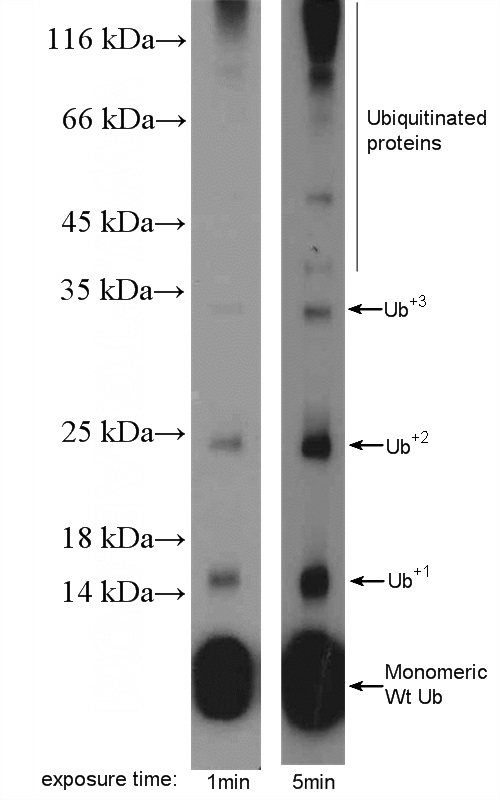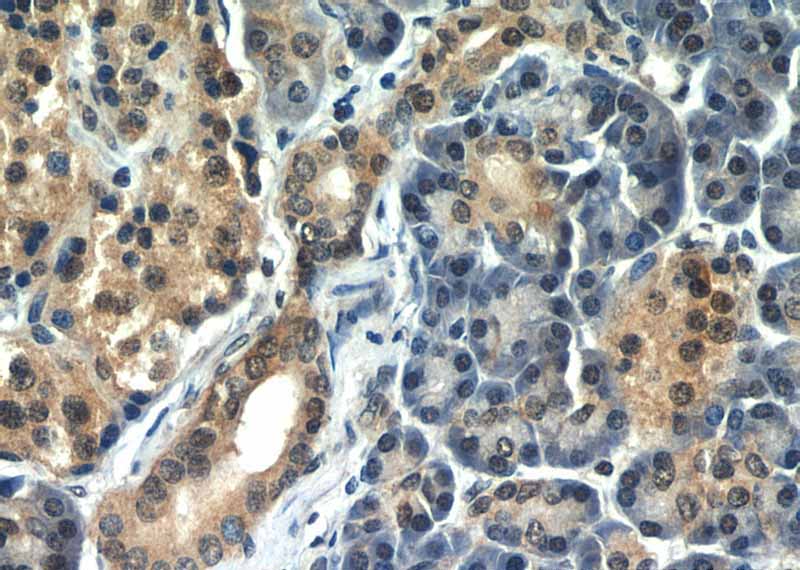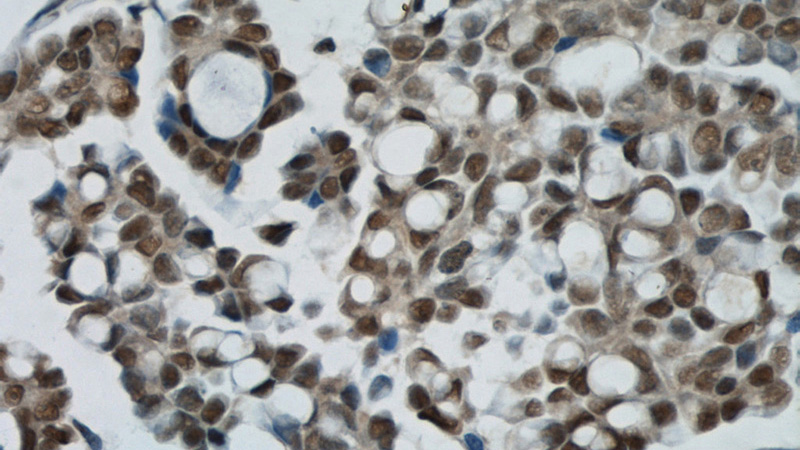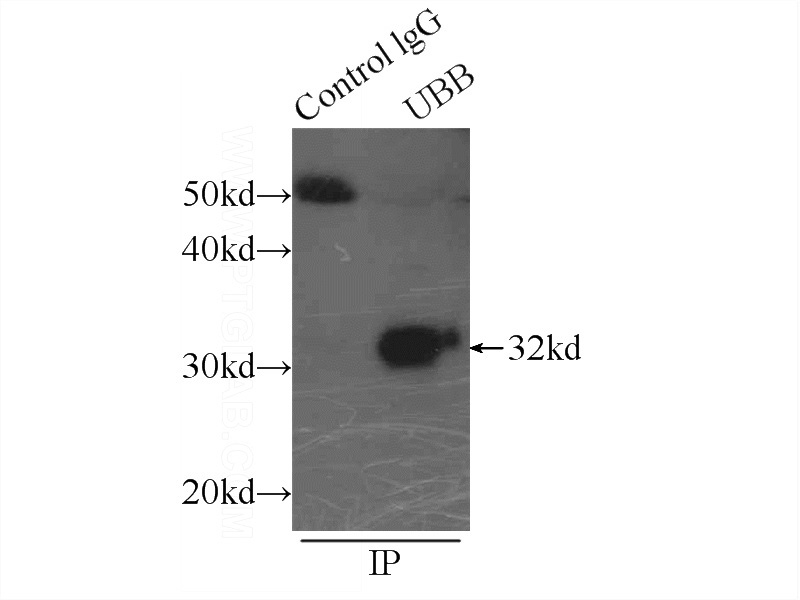-
Product Name
ubiquitin antibody
- Documents
-
Description
ubiquitin Rabbit Polyclonal antibody. Positive IHC detected in human pancreas tissue, human ovary tumor tissue. Positive WB detected in MDA-MB-453s cells, HeLa cells, MCF7 cells, mouse liver tissue. Positive IP detected in mouse liver tissue. Observed molecular weight by Western-blot: 8 kDa, 24 kDa
-
Tested applications
ELISA, IHC, IP, WB
-
Species reactivity
Human,Mouse,Rat; other species not tested.
-
Alternative names
FLJ25987 antibody; Polyubiquitin B antibody; UBB antibody; ubiquitin antibody; ubiquitin B antibody
-
Isotype
Rabbit IgG
-
Preparation
This antibody was obtained by immunization of ubiquitin recombinant protein (Accession Number: NM_001281718). Purification method: Antigen affinity purified.
-
Clonality
Polyclonal
-
Formulation
PBS with 0.1% sodium azide and 50% glycerol pH 7.3.
-
Storage instructions
Store at -20℃. DO NOT ALIQUOT
-
Applications
Recommended Dilution:
WB: 1:200-1:2000
IP: 1:200-1:1000
IHC: 1:20-1:200
-
Validations

MDA-MB-453s cells were subjected to SDS PAGE followed by western blot with Catalog No:116649(ubiquitin Antibody) at dilution of 1:600

Immunohistochemical of paraffin-embedded human pancreas using Catalog No:116649(ubiquitin antibody) at dilution of 1:50 (under 40x lens)

Immunohistochemical of paraffin-embedded human ovary tumor using Catalog No:116649(ubiquitin antibody) at dilution of 1:50 (under 40x lens)

IP Result of anti-ubiquitin (IP:Catalog No:116649, 3ug; Detection:Catalog No:116649 1:300) with mouse liver tissue lysate 5000ug.
-
Background
Ubiquitin B (UBB) is a member of ubiquitin family, one of the most conserved proteins known. Ubiquitin B is required for ATP-dependent, non-lysosomal intracellular protein degradation of abnormal proteins and normal proteins with a rapid turnover. Ubiquitin B is covalently bound to proteins to be degraded, and presumably labels these proteins for degradation. Ubiquitin also binds to histone H2A in actively transcribed regions but does not cause histone H2A degradation, suggesting that ubiquitin is also involved in regulation of gene expression.When polyubiquitin is free (unanchored-polyubiquitin), it also has distinct roles, such as in activation of protein kinases, and in signaling. This gene consists of three direct repeats of the ubiquitin coding sequence with no spacer sequence. Consequently, the protein is expressed as a polyubiquitin precursor with a final amino acid after the last repeat. Aberrant form of this protein has been noticed in patients with Alzheimer's and Down syndrome. Interestingly ubiquitin also becomes covalently bonded to many types of pathological inclusions which appear to be resistant to normal degradation.
-
References
- Dehvari N, Mahmud T, Persson J. Amyloid precursor protein accumulates in aggresomes in response to proteasome inhibitor. Neurochemistry international. 60(5):533-42. 2012.
- Hetzenecker AM, Seidl MC, Kosovac K. Downregulation of the ubiquitin-proteasome system in normal colonic macrophages and reinduction in inflammatory bowel disease. Digestion. 86(1):34-47. 2012.
- Tian Y, Ding W, Wang Y. Ubiquitin B in cervical cancer: critical for the maintenance of cancer stem-like cell characters. PloS one. 8(12):e84457. 2013.
- Zhu Z, Liu Y, Li K. Protein tyrosine phosphatase receptor U (PTPRU) is required for glioma growth and motility. Carcinogenesis. 35(8):1901-10. 2014.
- Zhang W, Zhang L, Zan Y, Du N, Yang Y, Tien P. Human respiratory syncytial virus infection is inhibited by IFN-induced transmembrane proteins. The Journal of general virology. 96(Pt 1):170-82. 2015.
- Huang D, Du X, Yuan R. Rock2 promotes the invasion and metastasis of hepatocellular carcinoma by modifying MMP2 ubiquitination and degradation. Biochemical and biophysical research communications. 453(1):49-56. 2014.
- Fawzi AA, Simonett JM, Purta P. Clinicopathologic report of ocular involvement in ALS patients with C9orf72 mutation. Amyotrophic lateral sclerosis & frontotemporal degeneration. 15(7-8):569-80. 2014.
- Li H, Liu Q, Wang Z. The oncoprotein HBXIP modulates the feedback loop of MDM2/p53 to enhance the growth of breast cancer. The Journal of biological chemistry. 290(37):22649-61. 2015.
Related Products / Services
Please note: All products are "FOR RESEARCH USE ONLY AND ARE NOT INTENDED FOR DIAGNOSTIC OR THERAPEUTIC USE"
